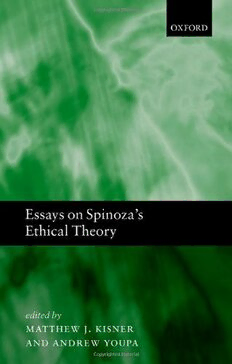
Essays on Spinoza's Ethical Theory PDF
Preview Essays on Spinoza's Ethical Theory
Essays on Spinoza’s Ethical Theory Essays on Spinoza’s Ethical Theory EDITED BY Matthew J. Kisner and Andrew Youpa 1 1 Great Clarendon Street, Oxford, Ox2 6Dp, United Kingdom Oxford University press is a department of the University of Oxford. It furthers the University’s objective of excellence in research, scholarship, and education by publishing worldwide. Oxford is a registered trade mark of Oxford University press in the UK and in certain other countries © The several contributors 2014 The moral rights of the authors have been asserted First Edition published in 2014 Impression: 1 All rights reserved. No part of this publication may be reproduced, stored in a retrieval system, or transmitted, in any form or by any means, without the prior permission in writing of Oxford University press, or as expressly permitted by law, by licence or under terms agreed with the appropriate reprographics rights organization. Enquiries concerning reproduction outside the scope of the above should be sent to the Rights Department, Oxford University press, at the address above You must not circulate this work in any other form and you must impose this same condition on any acquirer published in the United States of America by Oxford University press 198 Madison Avenue, New York, NY 10016, United States of America British Library Cataloguing in publication Data Data available Library of Congress Control Number: 2013958187 ISBN 978–0–19–965753–7 printed and bound in Great Britain by CpI Group (UK) Ltd, Croydon, cr0 4yy Links to third party websites are provided by Oxford in good faith and for information only. Oxford disclaims any responsibility for the materials contained in any third party website referenced in this work. Acknowledgements We wish to thank peter Momtchiloff at Oxford University press and Steven Nadler for their assistance in guiding us through the editing process. We also wish to thank Michael LeBuffe for organizing and hosting a workshop on the ethics of Spinoza’s Ethics in the fall of 2011, which gave us the wonderful opportunity to meet and speak with the contributors in person and gave the contributors the opportunity to present early drafts of the essays collected here. Thanks also to Stephen H. Daniel, Fasken Chair in Distinguished Teaching at Texas A&M, for his many contributions to the workshop’s success. For their generosity in funding the meeting we are grateful to the Texas A&M Department of philosophy, College of Liberal Arts, and The Melbern G. Glasscock Center for the Humanities. We are also grateful to our home institutions, Southern Illinois University and the University of South Carolina, for their support of our research, as well as anonymous referees from Oxford University press for their helpful comments. Finally, we dedicate this volume to the memory of paul Hoffman. We are honored that paul originally accepted our invitation to contribute an essay to this volume, and although this volume is inestimably less valuable without it, we are grateful for his contribution to our lives as a philosopher, scholar, teacher, and friend. Contents Abbreviations ix Contributors xi Introduction 1 Matthew J. Kisner and Andrew Youpa The Ethics in Spinoza’s Ethics 20 John Carriero The Lives of Others: Spinoza on Benevolence as a Rational Virtue 41 Steven Nadler Spinozistic Constructivism 57 Charles Jarrett politics and Ethics in Spinoza: The problem of Normativity 85 Michael A. Rosenthal Spinoza on the Life According to Nature 102 Jon Miller Spinoza on Being Human and Human perfection 124 Karolina Hübner Spinoza, the Body, and the Good Life 143 Susan James Man is a God to Man: How Human Beings Can Be Adequate Causes 160 Eugene Marshall Following a Recta Ratio Vivendi: The practical Utility of Spinoza’s Dictates of Reason 178 Justin Steinberg Necessity and the Commands of Reason in the Ethics 197 Michael LeBuffe Desire and Good in Spinoza 221 Olli Koistinen From Ordinary Life to Blessedness: The power of Intuitive Knowledge in Spinoza’s Ethics 236 Sanem Soyarslan VIII CONTENTS Spinoza on Virtue and Eternity 258 Valtteri Viljanen Bibliography 273 Index 283 Abbreviations This volume uses the following abbreviations for referring to primary literature. AT Oeuvres de Descartes, 11 vols., eds. Charles Adam and paul Tannery (paris: J. Vrin, 1964–74). C The Collected Works of Spinoza, vol. i, trans. Edwin Curley (princeton: princeton University press, 1985). CM Metaphysical Thoughts (Cogitata Metaphysica), Spinoza’s appendix to his Principles of Cartesian Philosophy (Renati Des Cartes Principiorum Philosophiae, Pars I et II, More Geometrico demonstratae). CSM/K The Philosophical Writings of Descartes, ed. and trans. John Cottingham, Robert Stoothoff and Dugald Murdoch (Cambridge University press, 1984, 1985), vol. iii, trans. Anthony Kenny (1991). G Spinoza Opera, 4 vols. (vol. v, 1987), ed. Carl Gebhardt (Heidelberg: Carl Winter, 1925). KV Spinoza’s Short Treatise on God, Man and His Well-Being (Korte Verhandeling van God, de Mensch en des zelfs Welstand). S Spinoza: Complete Works, trans. Samuel Shirley (Indianapolis: Hackett publishing Company, 2002). TIE Spinoza’s Treatise on the Emendation of the Intellect (Tractatus de Intellectus Emendatione). TP Spinoza’s Political Treatise (Tractatus Politicus). TTP Spinoza’s Theologico-Political Treatise (Tractatus Theologico-Politicus). The CM is cited by part and chapter number. The KV, TP, and TTP are cited by chapter number and sometimes also by the section numbers introduced in the Bruder edition of Spinoza’s works and reproduced in many subsequent editions. The TIE is cited by section number from the Bruder edition. G is cited by volume number, page num- ber, and sometimes by line number. Some of the essays employ further abbreviations, which are explained within the notes of those essays. Spinoza’s Correspondence is cited by letter number from J. Van Vloten and J. p. N. Land’s 1882 edition of Spinoza’s collected works. References to Spinoza’s Ethics first cite the part, and then use the following abbreviations: a axiom app appendix c corollary d demonstration l lemma D definition DOE Definition of the Emotions (end of part 3)
